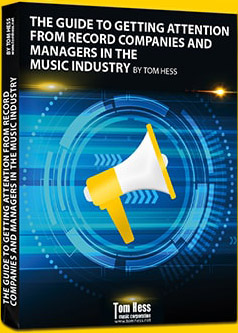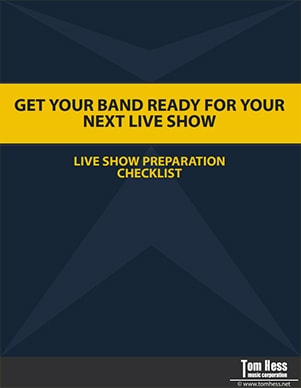How To Play Better Music Gigs To Make Your Live Shows Go Smoothly

EMAIL TO GET ACCESS
By submitting your info, you agree to send it to Tom Hess Music Corporation who will process and use it according to their privacy policy.
If you want to get more gigs...
... better paying gigs...
... and gigs at bigger venues that actually grow your career...
... then you'd better get people talking about your live shows before and after you play.
Using word of mouth is the very best way to get more people to repeatedly come out and see your band play live.
When your live show is great...
... people will love it and talk about you to their friends.
(Both online and offline.)
And when that happens...
... you'll often have club owners and booking agents reaching out to 'you' asking you to play at their venue.
And how do you get word of mouth working for you?
Well, that's what this music career article is all about.
It all starts with making your live shows run tightly and pro.
And here are 5 easy ways to start playing better music gigs:
Play Better Music Gigs - Tip #1: Refine Your Individual Playing
The most important thing you can do (individually) to prepare for your music gigs is to focus on playing your songs consistently well when conditions are not ideal. To improve this, practice your songs in a wider variety of environments and situations.

EMAIL TO GET ACCESS
By submitting your info, you agree to send it to Tom Hess Music Corporation who will process and use it according to their privacy policy.
For example:
- Play your songs while standing
- Play your songs while walking around the room
- Practice playing in the dark
- Play under a strobe light (if you have one)
- Play your instrument while talking (unless you are a singer)
- Play without looking at your instrument
- Play while your friends are listening and/or while the TV on
- Practice playing outside
The more you practice in these different scenarios, the better you will play when it really matters.
Watch this video to learn more tips on how to play better music gigs:
Note: these ideas work for all instruments (including singing), not only for electric guitar.
Play Better Music Gigs - Tip #2: Refine Your Band’s Performance
While preparing to play better music gigs, you should NOT be focused on learning the songs or playing the songs correctly. If your bandmates cannot play the songs flawlessly BEFORE the band rehearses, send them home to learn the songs. Once they’ve done their homework and learned the music, bring them back to the rehearsals.

Band practice is not for holding people’s hand through the process of learning the songs. Everyone in your band needs to learn the music on their own. If you have a bandmate who needs help learning the songs, meet alone with that person to help them. If this is a consistent problem, you may need to replace that band member.
The purpose of band rehearsals is to get the band to play the songs TIGHT rhythmically, with matching dynamic levels and with great stage presence to play better music gigs.
 A Sure Way To Get A Record Deal
A Sure Way To Get A Record DealLearn the exact steps to take that
will lead you to a big record deal.
 What The Music Industry Looks For
What The Music Industry Looks ForTake this test to see how much you
know on how the music biz works.
 7 Steps To Start Your Music Career
7 Steps To Start Your Music CareerLearn what you must do right now
to prepare for the music industry.
It can be very difficult to know how well your band is in these areas during practice. The solution is to record rehearsals in 2 ways:
- Video record your rehearsals. When you watch the video, turn the volume OFF and simply pay attention to how the band looks visually.
This helps you to focus on stage presence and the visual impact your band may (or may not) have on your audience.
- Audio record your rehearsals into a computer. Make sure that each instrument is recorded onto its own track (multi track record). Do NOT listen to the audio from the video recording!
The first thing to do is LOOK at the recording on the computer screen. You want to notice patterns of rhythmic flaws. Is your bass player always playing slightly before the beat? Is your guitar player always slightly late (playing behind the beat)?
For many people it is much easier to see the problem on the screen than to hear it. After you see your rhythmic inconsistencies (if any), you will be able to hear them much more easily. This exercise helps your band to play much tighter rhythmically (which is absolutely critical when performing).
Also listen to how the dynamic levels of the band change. Does everyone get louder and softer at the same time? Or is everyone doing their own thing randomly?
It almost always sounds best when everyone in the band changes their dynamic level at the same time. There is a big difference between varying dynamic levels at a carefully chosen moment and sloppy & inconsistent playing.
To help you remember what your band needs to do before each of your music gigs, download this live show preparation checklist. (It’s free and no email address is required). Print it out and keep it handy, so you always feel prepared for every show.
Play Better Music Gigs - Tip #3: Refine Your Stage Presence
When you play music gigs, your music is only 50% of what most people in your audience care about. The other 50% is what they see. Remember, they came to see and hear your gig. Some great sounding bands often lack bigger success because their live shows suffer from lame stage presence. If you want more people to consistently come out to your music gigs, develop great stage presence.
1. The better your stage presence is, the more your audience will like your show. This makes them more likely to come back to see your music gigs in the future with their friends.
2. The larger your audience is, the easier it becomes for you to get music gigs in bigger & better venues in your area. Venue owners (and booking agents) want to see proof of your ability to draw a big crowd to your shows.
3. The more gigs you get, the more money you make in the short term and in the long term. In the short term, you make more money from getting more gigs. In the long term, you build your reputation as an in-demand live band throughout your local area. This gives you greater negotiating power to command more money for gigs you play in the future.
4. The more your audience enjoys your show, the more likely they are to buy your music & merchandise, sign up for your mailing list or do anything else you want them to do after the show.
Schedule at least 50% of your band’s rehearsal time to analyze your stage presence skills. Watch video recordings of your rehearsals and take notes on what you notice. You can make a lot of improvement through simple self-analysis.
(Want to learn more killer strategies for playing better music gigs in more venues? Download this free eGuide on how to get more music gigs and become the #1 band in your city.)

Bonus: Play better music gigs by recording your live shows whenever possible.
Why?
Reason #1: You get more feedback about how your band actually looks (and sounds) during music gigs. This tells you what to focus on during your band’s rehearsals (and individual practice) to play better music gigs.
Reason #2: You can use (the best) footage from your live music gigs to promote your band on your website and social media.
Play Better Music Gigs - Tip #4: Eliminate (Or At Least Reduce) Stage Fright
Even if you have cool music, a cool band and have prepared well to give your audience an awesome show, all of it can be destroyed by stage fright. Many musicians simply don’t perform well on stage due to anxiety. Don’t let this happen to you and your band.
You have worked too hard to let fear cripple you. Your audience deserves better, and more importantly, YOU deserve better! You are on stage to have fun, not to be nervous every moment during your music gigs. Want to eliminate performance anxiety?
Check out this stage fright article to learn how.
Here are some confidence-boosting things to think about in order to play better music gigs:
- Most people in the audience won’t notice if you make mistakes in your playing. (Acoustics are not great in most venues and it’s hard to hear every note, even if you play perfectly.)
- People in the audience are thinking about themselves a lot more than they are thinking about you. They come to the show to have a great time and enjoy themselves… not to judge you on how many mistakes you make in your playing :)
- Many people in the audience look up to you (the performer) and wish they could be like you. To them, you are a rock star.
- Accept that you will never play as well live as you can in your bedroom. Do your best to play as well as you can and keep practicing in between gigs to play better at your next show.
Play Better Music Gigs - Tip #5: Focus On Performance Logistics
In addition to stage fright, there are other things that may happen during your music gigs that can hurt them. The main two issues are: not being able to hear and not being able to see.
If you’ve already played music gigs, then you know that every gig sounds different. One night you can’t hear the bass, the next night you can’t hear yourself, etc.
When you are the opening band, you typically don’t get a sound check before you play. Very often you have no idea what you will be able to hear (or not hear) on stage until you start playing the first song.
How to play better music gigs in this situation:
One of the best ways to prepare for not being able to hear all the instruments during music gigs is to practice your songs with only ONE other instrument. For example: practice playing only with the bass player. Next, practice the song only with the drummer. This will prepare you for when you can only hear some of the instruments.
The next logistical problem is not being able to see. Live stages are often dark in some moments and extremely bright in other moments. This makes it very hard to see your instrument. My eyes are very sensitive to light, so I always play with dark sunglasses on (since the bright lights often blind me on stage without them).
How to play better music gigs in this situation:
For dark situations, you can add white-out (or glow-in-the-dark markers) on your instrument. This helps you to clearly see what you are playing even in very low light. Plan out a solution for playing in the dark.
Also, practice playing your songs while looking at your instrument as little as possible. This is another great way to prepare for unexpected lighting problems during music gigs.
You now know how to play better music gigs. The next step is to learn how to get attention from record companies and managers, so you build your career faster. Download this free music career eGuide to learn how to get record companies to notice you & start building a career you can feel really proud of.


Discover how to get into the music business by reading this music career building page now.



